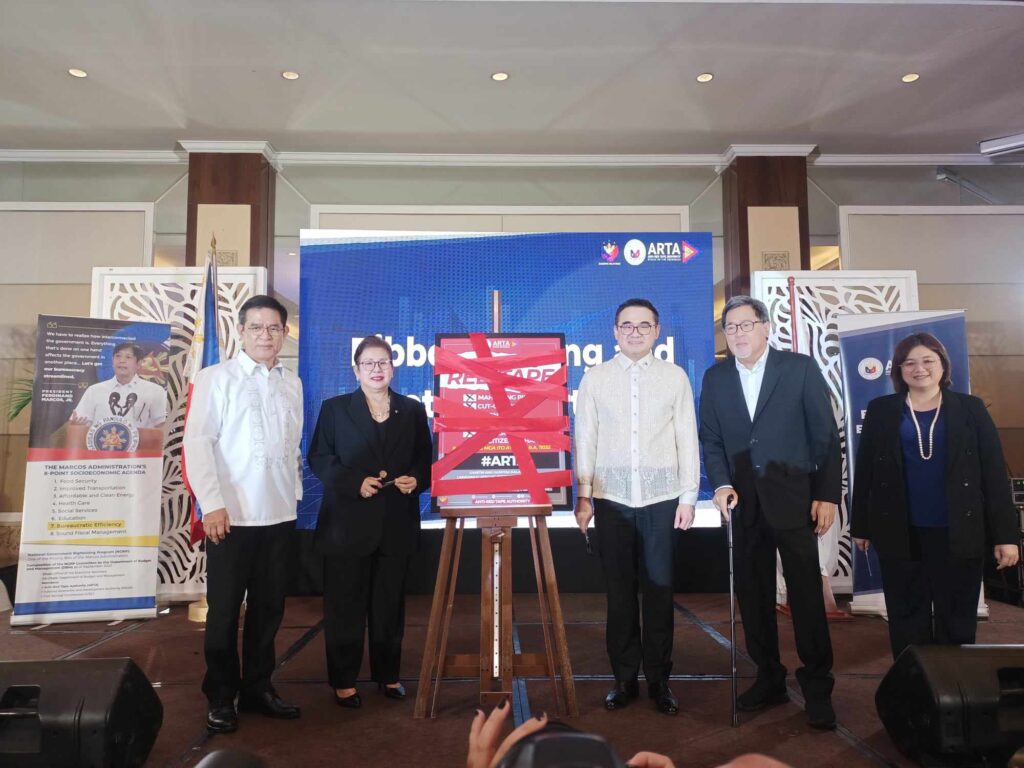
By Perfecto T. Raymundo, Jr.
MANILA — The Economic and Ease of Doing Business (EODB) Briefing was held on Wednesday (Jan. 24) at the historic Manila Hotel here in the country’s capital.
With the theme: “Charting Progress through Strategic Investment and Boosting Economic Opportunities”, the Economic and EODB Briefing is a strategic engagement to forge stronger inter-agency collaborations on further stimulating economic growth in the Philippines.
Undersecretary Gerald G. Divinagracia, Deputy Director General for Operations of ARTA, acknowledged the participants and delivered the welcome remarks.
Republic Act (RA) No. 11032, otherwise known as the “Ease of Doing Business and Efficient Government Service Delivery Act of 2018”, ARTA is mandated to implement and oversee a national policy on anti-red tape and ease of doing business aimed at improving the business environment in the Philippines.
Through this briefing, the Anti-Red Tape Authority (ARTA) facilitates a venue to boost the information dissemination of government programs and initiatives that are geared towards increasing local and foreign investments in the country.
In coordination with both the public and private sector stakeholders, the Economic & EODB Briefing aims to fulfill the directives of President Ferdinand “Bongbong” R. Marcos, Jr. to promote ease of doing business under a whole-of-nation approach.
Secretary Atty. Ernesto V. Perez, a certified public accountant by professional training, ARTA Director General said that the agency was directed by no less than President Ferdinand “Bongbong” R. Marcos, Jr. to pave the way for the “ease of doing business” beginning today with the “economic and ease of doing business briefing”.
“From red tape to red carpet. It is not just a talk show shot but a collective commitment to transform our economic landscape,” Perez, also a litigation lawyer himself, said.
“The 3.0 days more than their more established counterparts based on new businesses in their early years. The investors bear the brunt of these new challenges,” Perez said.
“It should be an opportunity to achieve an economic progress. Each additional year increases the probability of new MSMEs by 10.2 percent,” he added.
According to Perez, President Ferdinand “Bongbong” R. Marcos, Jr. has ignited the “torch” for economic progress “and We the ARTA carry that torch.”
ARTA is committed to capacity-building providing the necessary support to the stakeholders to be able to have the “ease of doing business”.
“We will not stop at investigating, prosecuting government officials and employees who are refusing to implement RA 11032,” Perez said.
According to the ARTA Director General, they have already filed charges against government officials and employees who failed to enforce and implement the “Ease of Doing Business and Efficient Government Service Delivery Act of 2018”.
Perez noted that ARTA has partnered and collaborated with the Department of the Interior and Local Government (DILG) and the Department of Information and Communication Technology (DICT) in order to fully implement the Ease of Doing Business Law.
He cited that ARTA has secured the full compliance of electronic business one stop shops, with the fastest processing time, and with the target for this year of 10-minute business permit applications as instructed by President Marcos.
ARTA is now in the process of implementing two key digital platforms such as the ARTA Electronic Management Information System and the Philippine Business Regulations.
“With the continued collaborative effort with the DICT, the ARTA is set to establish the Philippine Business Data Bank in order to streamline and facilitate the ease of doing business in the country,” Perez said.
He acknowledged the fact that ARTA cannot do it alone, but everyone’s cooperation is needed in order to make the reforms work.
Secretary Frederick Go, Special Assistant to the President for Investment and Economic Affairs (OSAPIEA), noted that it’s his first speaking engagement following his appointment to the Cabinet of President Marcos.
“In this regard, it is imperative to have the “Ease of Doing Business. In short, cutting red tape,” Go said.
He cited that the business sector has become “happy” because of ARTA.
“I’m sure that ARTA has been implementing the Ease of Business Law,” he added.
Go boasted of the Php500 million investmens for the Green Lane for Business Strategy, including the Renewable Energy.
“There is the potential US$ 1 billion in the Green Lane Business,” he said.
“The right to match comparative projects was strengthened by the PPP Law. The PPP Center is now drafting the IRR (Implementing Rules and Regulations) of the PPP Law, which was passed into law last December (2023),” he added.
Classification of the A 180-day period for the BIR to streamline the processing of the tax refund.
There is the proposal to strengthen the Investments Promotion Agencies (IPAs) such as the SBMA, PRA, economic zone authority, to be able to empower them more to attract more investments.
“12 years of “sunshine” period is proposed to protect and preserve the investments. Openness, efficiency and transparency are being assured by the agency,” Go said.
“Through the ‘whole-of-nation approach’, economic progress will be achieved. Things are going in the right direction for the ease of doing business” he added.
Go highlighted the 45-day timeline of period of review of business applications by the Securities and Exchange Commission (SEC).
At present, 52 stock companies benefitted from the BOT Law was amended, which was 27 years old already.
He pointed out that a handful of companies would be included in the program, but now 52 companies are included in the program.
“One of our priority programs is the National Digital ID to avert corruption, simplify business processing and facilitate the ease of doing business,” Go said.
“To the world, the Philippines is now open for business. My office is here to synchronize and implement the economic agenda of President Marcos,” he added.
During the “fire side chat”, Go said that “assuming we are the only in the global economic map, we really have to be globally competitive in the sense that investors are all in the world economic map.”
Also expected to attend were Sabin Aboitiz, Lead Convenor of the Private Sector Advisory Council (PSAC), and Enunina “Nina” Mangio, President of the Philippine Chamber of Commerce and Industry (PCCI).
Guillermo M. Luz, Board of Trustees Member of the Asian Institute of Management (AIM), said that it’s not only the transaction costs, but the economic costs that burden the investors.
Luz cited that aside from these laws, there are also the repealing laws, which the 19th Congress may look into in order to assure the ease of doing business.
“All LGUs (local government units) should follow a single rule because of the Local Government Code (Republic Act No. 9160),” Luz said.
Perez said that they have established the Philippine Business Information System, requiring all government agencies to post their rules, regulations and guidelines in order to get rid of the conflicting provisions.
Also expected to join were Dr. Enrico L. Basilio, Director of the University of the Philippines-National College of Public zAdministration and Governance-Center for Policy and Executive Development (UP-NCPAG-CPED), Dr. Roberto Martin Galang, Dean of the John Gokongwei School of Management, Ateneo de Manila University.
Joining the event were representatives from the diplomatic corps, national government agencies (NGAs), state universities and colleges (SUCs), government-owned and/or controlled corporations (GOCCs), local and foreign chambers of commerce, business groups, and non-government organizations (NGOs).



